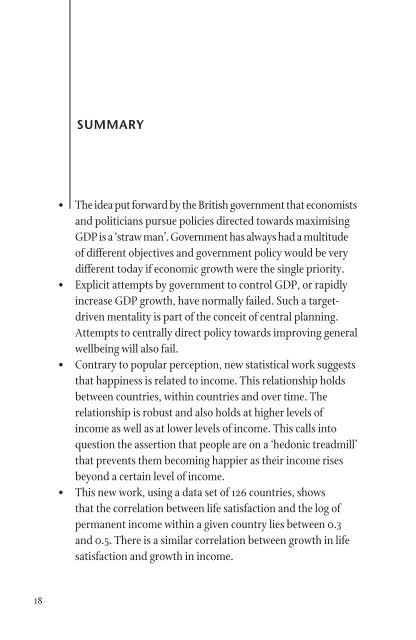… and the Pursuit of Happiness - Institute of Economic Affairs
… and the Pursuit of Happiness - Institute of Economic Affairs
… and the Pursuit of Happiness - Institute of Economic Affairs
You also want an ePaper? Increase the reach of your titles
YUMPU automatically turns print PDFs into web optimized ePapers that Google loves.
summary<br />
Summary<br />
• The idea put forward by <strong>the</strong> British government that economists<br />
<strong>and</strong> politicians pursue policies directed towards maximising<br />
GDP is a ‘straw man’. Government has always had a multitude<br />
<strong>of</strong> different objectives <strong>and</strong> government policy would be very<br />
different today if economic growth were <strong>the</strong> single priority.<br />
• Explicit attempts by government to control GDP, or rapidly<br />
increase GDP growth, have normally failed. Such a targetdriven<br />
mentality is part <strong>of</strong> <strong>the</strong> conceit <strong>of</strong> central planning.<br />
Attempts to centrally direct policy towards improving general<br />
wellbeing will also fail.<br />
• Contrary to popular perception, new statistical work suggests<br />
that happiness is related to income. This relationship holds<br />
between countries, within countries <strong>and</strong> over time. The<br />
relationship is robust <strong>and</strong> also holds at higher levels <strong>of</strong><br />
income as well as at lower levels <strong>of</strong> income. This calls into<br />
question <strong>the</strong> assertion that people are on a ‘hedonic treadmill’<br />
that prevents <strong>the</strong>m becoming happier as <strong>the</strong>ir income rises<br />
beyond a certain level <strong>of</strong> income.<br />
• This new work, using a data set <strong>of</strong> 126 countries, shows<br />
that <strong>the</strong> correlation between life satisfaction <strong>and</strong> <strong>the</strong> log <strong>of</strong><br />
permanent income within a given country lies between 0.3<br />
<strong>and</strong> 0.5. There is a similar correlation between growth in life<br />
satisfaction <strong>and</strong> growth in income.<br />
• There is no evidence that equality is related to happiness.<br />
Indeed, <strong>the</strong> proponents <strong>of</strong> greater income equality admit<br />
that <strong>the</strong>y are unable to cite such evidence <strong>and</strong> instead rely on<br />
very unsatisfactory forms <strong>of</strong> indirect inference. The clearest<br />
determinants <strong>of</strong> wellbeing would seem to be employment,<br />
marriage, religious belief <strong>and</strong> avoiding poverty. None <strong>of</strong> <strong>the</strong>se<br />
is obviously correlated with income equality.<br />
• The government is under pressure to bring in fur<strong>the</strong>r<br />
legislation to promote ‘wellbeing at work’. This includes,<br />
for example, legislation on parental leave. The <strong>the</strong>oretical<br />
<strong>and</strong> empirical case for such legislation is weak. There is no<br />
relationship between objective measures <strong>of</strong> wellbeing at<br />
work <strong>and</strong> <strong>the</strong> extent <strong>of</strong> employment protection legislation,<br />
unionisation, <strong>and</strong> so on. Given <strong>the</strong> relationship between<br />
wellbeing <strong>and</strong> employment, any form <strong>of</strong> employment<br />
protection legislation that led to more temporary<br />
employment or reduced employment would be detrimental<br />
to wellbeing.<br />
• A comparison across 74 countries finds that government<br />
final consumption negatively affects happiness levels <strong>and</strong><br />
that <strong>the</strong> negative influence occurs regardless <strong>of</strong> how effective<br />
government bureaucracy is or how democratic <strong>the</strong> country<br />
is. Increasing government spending by about a third would<br />
cause a direct reduction in happiness <strong>of</strong> about 5 to 6 per cent.<br />
Centralising government decision-making is likely to lead to<br />
more intrusive government <strong>and</strong> lower wellbeing.<br />
• If people wish to maximise <strong>the</strong>ir wellbeing <strong>and</strong> are <strong>the</strong> best<br />
judges <strong>of</strong> <strong>the</strong>ir own wellbeing <strong>the</strong>y will take decisions about<br />
how to use <strong>the</strong>ir economic resources to pursue <strong>the</strong>ir own<br />
goals. We should allow people’s preferences for wellbeing to<br />
18<br />
19












